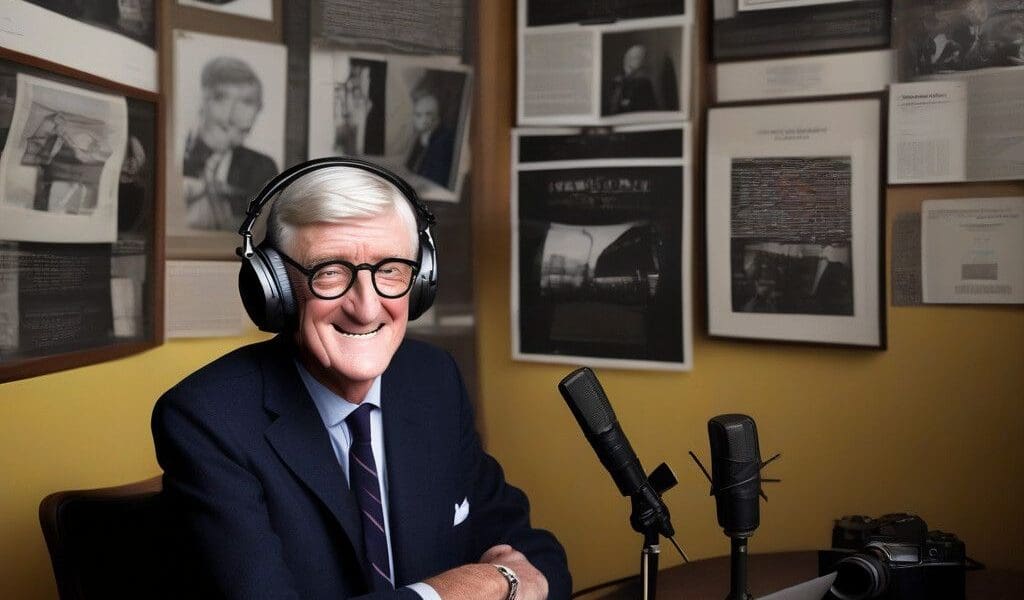AI Podcast Revives Sir Michael Parkinson: A Digital Legacy Reimagined
A groundbreaking new podcast named “Virtually Parkinson” utilizes artificial intelligence to recreate the iconic voice and interview style of legendary broadcaster Sir Michael Parkinson. This innovative project, produced by Deep Fusion Films with the collaboration of his family, aims to reignite interest in Parkinson’s legacy through conversations with modern guests, showcasing his signature interview approach across eight episodes.
The concept for “Virtually Parkinson” was conceived by Mike Parkinson, the son of the late broadcaster. This project arises amidst rising discussions regarding AI’s place in creative industries, particularly within the realms of entertainment and media. Mike emphasized the family’s commitment to transparency regarding the AI technology used, ensuring that audiences understand the voice they hear is not Sir Michael himself, but a synthetic re-creation. He reflected on how his father might have found this project fascinating, despite being known as somewhat of a technophobe.
The podcast’s structure mirrors Parkinson’s original approach to interviewing, characterized by its engaging style and insightful conversations. Co-creator Jamie Anderson notes that the AI-driven host maintains an “autonomous” role in the interviews, giving it an authenticity that honors Parkinson’s legacy while adapting to contemporary themes with today’s guests.
One of the significant benefits of this podcast is its potential to introduce Parkinson’s work to younger audiences who may not have been familiar with his broadcasts. By blending nostalgia with modern technology, the series serves as a bridge connecting the past with the present. This approach not only preserves historical context but also ensures relevance in contemporary discourse.
However, this technological advancement also brings forth ethical considerations. The use of AI to recreate the likeness and voice of a deceased public figure raises questions about the implications for living artists and public figures. Critics argue that such endeavors could contribute to a culture where genuine talent and creativity are undervalued in favor of synthetic copies. Here, Mike Parkinson stands firm on the belief that this podcast is not about replacing real talent but rather extending his father’s legacy in a unique and innovative way.
The AI segment of the podcast raises fundamental questions about originality and authenticity in creative expression. In an era where technology resources are expanding, AI is consistently scrutinized for its capability to mimic human creativity. This not only draws attention to the risks involved but also opens up a dialogue about the future of content generation in digital mediums. For instance, would audiences prefer a stable, AI-driven dialogue, or would they demand the spontaneity and nuance that a living host could provide?
The production of “Virtually Parkinson” has also impacted the discourse around intellectual property rights. The fine line between homage and infringement often leads to heated debates among creators, legal experts, and the media. The family has taken significant steps to ensure that the integrity of Sir Michael’s brand is respected, navigating the complex landscape of AI usage in creative contexts. This awareness and sensitivity can provide a model for other artists considering similar endeavors.
In addition to addressing these ethical and legal dimensions, the podcast serves a practical purpose: it taps into a growing audience interested in nostalgia combined with technology. The modern listener seeks new content that resonates with their cultural heritage while leveraging innovations that enhance their experience. Hence, “Virtually Parkinson” is also positioned as a case study in effective digital marketing, harnessing the power of AI to create relatable content.
As the line between the real and the digital becomes increasingly blurred, projects like “Virtually Parkinson” will likely shape the future of media consumption. Striking a balance between innovation and ethical responsibility will be essential in this evolving landscape. Future creators will have to consider not only the immediate appeal of AI in their work but also the broader implications such technologies hold for their fields.
Overall, “Virtually Parkinson” stands as an intriguing example of how artificial intelligence can be harnessed to celebrate and prolong legacies, while simultaneously prompting vital discussions about ethics in art and technology. By raising awareness about both possibilities and pitfalls associated with AI applications in media, this project invites audiences to rethink their relationship with technology in the art world.








